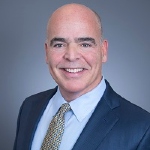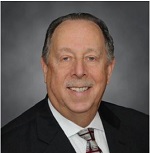TSL Feature Articles
-
 Isn’t That What it Says? --Potential Perils of Incorporation by Reference in Finance Transactions
Isn’t That What it Says? --Potential Perils of Incorporation by Reference in Finance Transactions
The author discusses the potential perils of improper use of “incorporation by reference” in commercial lending transactions, as well as potential strategies for reducing potential incorporation by reference hazards.
-
 Syndicated ABL Volume up in 2019, Deal Count Down
Syndicated ABL Volume up in 2019, Deal Count Down
Refinitiv’s director of analytics shares with readers the latest data surrounding the syndicated market.
-
 SFNet Education Focus 20/20 Dynamic Educational Content is Key for Members
As the Secured Finance Network celebrates its 75th anniversary, its commitment to the education of its membership remains tantamount to the organization. Part of that commitment is making sure that secured lenders of all stripes are provided with the essential tools, training, and best practices to ensure their professional success.
SFNet Education Focus 20/20 Dynamic Educational Content is Key for Members
As the Secured Finance Network celebrates its 75th anniversary, its commitment to the education of its membership remains tantamount to the organization. Part of that commitment is making sure that secured lenders of all stripes are provided with the essential tools, training, and best practices to ensure their professional success. -
 Interview with McGuire Woods’ Hamid Namazie
Interview with McGuire Woods’ Hamid Namazie
Hamid Namazie is managing partner of McGuireWoods’ Los Angeles - Downtown office. He concentrates his practice on representing a wide range of clients, including banks, institutional lenders and commercial finance companies, providing asset-based loans.
-
 Founded for Entrepreneurs By an Entrepreneur
Founded for Entrepreneurs By an Entrepreneur
FTC Commercial Corporation was launched in 2002 with a strong focus on small and medium-size enterprise. Co-founder Ken Wengrod tapped into his experience, having worked in factoring and retail to create a company that understands the entire trade cycle of manufacturing and importing.
-
 Lenders Think About Recession Readiness
The head of Capital One’s Financial Institutions Group reviews the trends that lenders should be watching as we shift into 2020.
Lenders Think About Recession Readiness
The head of Capital One’s Financial Institutions Group reviews the trends that lenders should be watching as we shift into 2020. -
Thoughts on the Third Quarter 2019 Asset-Based Lending Index
Q3 2019 results generally demonstrate the continuation of trends observed throughout 2019. Year to date, we continue to have growth in the industry as a whole and credit quality remains solid. There are a few notable deviations from trends observed throughout the year as we will see.
General economic conditions continue to be top of mind for the secured finance community, but it is interesting to note that we continue to see a divergence between Bank and Non-Bank Lenders with respect to the SFNet Confidence Index. As a reminder, starting in 2019, we have chosen to divide the ABL lender universe along Bank and Non-Bank lines, as opposed to our previous methodology of splitting up the ABL lender universe by portfolio size.
-
 Review and Forecast with Joseph Nemia, Executive Vice President - Head of Asset Based Lending at TD Bank
Review and Forecast with Joseph Nemia, Executive Vice President - Head of Asset Based Lending at TD Bank
Joseph Nemia looks back at 2019 and discusses what the secured finance industry can expect to see in 2020.
-
 Trade Finance Insights: Financing Trade Receivables Beyond ABL or Factoring
Trade Finance Insights: Financing Trade Receivables Beyond ABL or Factoring
A Demica senior director explains how trade receivable securitization programs can be used as a valuable alternative to other funding solutions, especially in cross-border or challenging credit environments.
-
 Putting Capital to Work - Far West Capital Customer: Drink Daily Greens
Jan 6, 2020Meet an entrepreneur trying to make the world a “greener” place.
Putting Capital to Work - Far West Capital Customer: Drink Daily Greens
Jan 6, 2020Meet an entrepreneur trying to make the world a “greener” place.
At 33 years old, Shauna was diagnosed with breast cancer - a head-spinning diagnosis for anyone, but especially a new mother at 33 who considered herself fairly healthy. Then came the draining, life-sapping chemo that would save her life, but leave her feeling weak and malnourished -
 UCC Insights - Looking For A Better Mouse Trap? Article 9 Sales Spring To Action.
UCC Insights - Looking For A Better Mouse Trap? Article 9 Sales Spring To Action.
The time and cost of liquidating collateral can often be prohibitive and is always a nuisance. Of course, this problem is exacerbated when the asset value is less than the balance owed to the secured creditor(s), leaving no value for unsecured creditors. Lenders often step up and carve out an amount to be distributed to unsecured creditors to enable a Chapter 11 to proceed to effect a sale of the debtor’s assets free and clear of liens. Some consider this to be a price to be paid by secured creditors for the privilege of utilizing the bankruptcy court to sell their collateral. Thus, the cost of a bankruptcy can be very expensive not only to the debtor, but also to the secured lender. As a result, small and middle-market companies and their lenders have grown receptive to non-bankruptcy vehicles for the disposition of assets.
-
 Purchase Order Financing: Then, Now and What’s Ahead
Purchase order financing has been around nearly as long as its close relatives (factoring) and distant ones (merchant banking), but has become much more prevalent in the last decade. With better technology and other innovations accelerating manufacturing and production timelines to meet demand from e-commerce and big box customers, the global supply chain has never been under more stress. We see this with the China tariffs, Brexit and other significant changes to trade policy. Purchase order financing has never been a more valuable option for companies buying and selling around the globe.
Purchase Order Financing: Then, Now and What’s Ahead
Purchase order financing has been around nearly as long as its close relatives (factoring) and distant ones (merchant banking), but has become much more prevalent in the last decade. With better technology and other innovations accelerating manufacturing and production timelines to meet demand from e-commerce and big box customers, the global supply chain has never been under more stress. We see this with the China tariffs, Brexit and other significant changes to trade policy. Purchase order financing has never been a more valuable option for companies buying and selling around the globe. -
 The Digital Transformation is Severely Disrupting Retail: The Time for Action is Now
The Digital Transformation is Severely Disrupting Retail: The Time for Action is Now
The transformation of retail is creating new and significant challenges for traditional retailers. Antony Karabus, CEO of HRC Advisory, explores those obstacles and offers solutions to help retailers survive – and even thrive — during these tumultuous times.
-
 Interview with Incoming SFNet President John DePledge
John DePledge currently serves as the head of Asset Based Lending of Bank Leumi USA. With over 35 years of ABL experience, John has built portfolios in numerous new markets and has held senior leadership roles in originations, portfolio management, underwriting, asset recovery and field examination. Here, he outlines SFNet’s 2020 goals after its recent transformation.
Interview with Incoming SFNet President John DePledge
John DePledge currently serves as the head of Asset Based Lending of Bank Leumi USA. With over 35 years of ABL experience, John has built portfolios in numerous new markets and has held senior leadership roles in originations, portfolio management, underwriting, asset recovery and field examination. Here, he outlines SFNet’s 2020 goals after its recent transformation. -
 SFNet Hall of Fame Inductees
Oct 16, 2019When we set out to rebrand the Commercial Finance Association over a year ago, we knew we wanted to build on our proud heritage while looking to the future. That timeless adage “remember where you came from” was at the forefront of our minds as we discussed the new brand. There were many positive attributes that we wanted to preserve as we planned to reposition our value proposition to align with the priorities of our diverse network.
SFNet Hall of Fame Inductees
Oct 16, 2019When we set out to rebrand the Commercial Finance Association over a year ago, we knew we wanted to build on our proud heritage while looking to the future. That timeless adage “remember where you came from” was at the forefront of our minds as we discussed the new brand. There were many positive attributes that we wanted to preserve as we planned to reposition our value proposition to align with the priorities of our diverse network. -
 The TSL Interview: Michael D. Sharkey: Celebrating 40 Years in ABL
Sep 20, 2019
The TSL Interview: Michael D. Sharkey: Celebrating 40 Years in ABL
Sep 20, 2019Michael D. Sharkey is the president of Fifth Third Business Capital. He oversees a nationwide market with regional offices across the United States and Canada. Sharkey is past president and chairman of Secured Finance Network. He is also past president of the American Brain Tumor Association. Sharkey is a graduate of Rutgers University and J. L. Kellogg Graduate School of Management at Northwestern University. Here he discusses his long career, the outlook for the industry and Fifth Third’s acquisition of MB.
-
 Lending to Business Aviation: Don’t Wing It
Lending to Business Aviation: Don’t Wing It
As with any industry, lending to the business aviation sector comes with its own set of risks. Shelley Svoren of First Republic Bank gives readers the insider’s tips on this industry.
-
 Ecommerce and the Omnichannel Equation
Ecommerce and the Omnichannel Equation
Tim Anderson of Hilco Valuation Services discusses Omnichannel appraisals, which are now more common than traditional brick-and-mortar appraisals.
-
 Middle-Market Companies Find Opportunity in Food & Beverage Disruption
Middle-Market Companies Find Opportunity in Food & Beverage Disruption
Capital One executives discuss how innovation in the food & beverage sector are making it an industry lenders don’t want to ignore.
-
 Construction: Cycles and Considerations in Lending
Construction: Cycles and Considerations in Lending
A Conway MacKenzie executive provides an overview of the construction industry, including its unique cycles. Lending into the construction sector can prove to be a lucrative decision if extensive due diligence is conducted deep into a company’s financials. There are a wide range of factors and potential pitfalls to consider, understand and navigate properly.
Click on the link below to meet some of the “difference makers” in the secured finance community. This issue of The Secured Lender celebrates those who are having a profound impact on both their communities and their organizations.
Previous TSL Articles
-
The Secured Finance Foundation: Helping to Advance the Future of Secured Finance
Sep 20, 2022The Secured Finance Foundation’s Corporate Giving Campaign, created to help prepare the next generation of leaders, provide essential data that drives smart business decisions, and invest in the communities of which our members are a part, will conclude on September 30.
As the secured finance industry continually grows and evolves, it takes knowledge, effort, and financial support for the Secured Finance Foundation (SFFound) to keep up with these changes and fulfill its mission. The Secured Finance Foundation encourages, facilitates, and supports education, innovation, and charitable works for the betterment of organizations and professionals who deliver and enable secured finance— and for the communities of which they are a part. Since it was founded 31 years ago, the Foundation has raised approximately $9.5 million to date. -
 Six Actions Your Retail Clients Can Take Now to Counter Economic Volatility
May 18, 2022
Six Actions Your Retail Clients Can Take Now to Counter Economic Volatility
May 18, 2022After historic GDP growth and retail sales in 2021, are the days of unprecedented growth over for your retail clients? The short answer: It’s complicated.
If the last two years have shown us anything, it is that uncertainty is the new normal. When COVID shut down the economy in March 2020, the impact on the retail sector was profound. In some parts of the country, brick and mortar stores were closed for up to 90 days and in-person sales ground to a halt for all but the most essential items.
-
 The Art and Science of Loaning Against Trademarks
May 16, 2022Trademarks are one of the fastest-growing collateral categories in the ABL sector—due in no small part to the ease with which owners of properly supported brands can sell their products via multiple channels, including e-commerce, m-commerce, wholesale distribution, and retail stores. On the consumer side, younger generations are driving much of the e-commerce and m-commerce demand. They have grown up absorbing branded content on Tik-Tok and Instagram and have also discovered the convenience of making brick-and-mortar returns.
The Art and Science of Loaning Against Trademarks
May 16, 2022Trademarks are one of the fastest-growing collateral categories in the ABL sector—due in no small part to the ease with which owners of properly supported brands can sell their products via multiple channels, including e-commerce, m-commerce, wholesale distribution, and retail stores. On the consumer side, younger generations are driving much of the e-commerce and m-commerce demand. They have grown up absorbing branded content on Tik-Tok and Instagram and have also discovered the convenience of making brick-and-mortar returns. -
Bankruptcy & Restructuring - Where are we Now? Update 2022
May 9, 2022The last two years have been a roller coaster for businesses. The early pandemic lockdowns initially wreaked havoc on small businesses; and then we saw what some consider to be a market overcorrection. Relief came in the form of PPP loans, Main Street Lending, and various other subsidies and programs. We look to the data – year over year commercial bankruptcy filings are down 31% and Chapter 11 filings are down 48%. Comparing 2021 to 2019, commercial bankruptcy filings are down 31% and Chapter 11 filings are down 33%.
-
 Next Frontier in Lending: High Net-Worth Lending
May 2, 2022Innovation in high net-worth lending is primed to be a new frontier in credit. Rarely do opportunities exist to make waves in lending, but this is one. Banks and wire houses are conservative and working on traditional lending models that limit borrower options for untapped equity in multiple forms of assets. There is also a wall between consumer and business lending units so most banks cannot take a holistic approach to a business owner’s business and personal assets. Several groups working together can, but this takes time, adds complexity and still has its limitations in a regulatory and traditional banking environment. Coincidentally, both commercial lenders and wealth managers are starting to converge on this space and each other’s turf by changing their offerings.
Next Frontier in Lending: High Net-Worth Lending
May 2, 2022Innovation in high net-worth lending is primed to be a new frontier in credit. Rarely do opportunities exist to make waves in lending, but this is one. Banks and wire houses are conservative and working on traditional lending models that limit borrower options for untapped equity in multiple forms of assets. There is also a wall between consumer and business lending units so most banks cannot take a holistic approach to a business owner’s business and personal assets. Several groups working together can, but this takes time, adds complexity and still has its limitations in a regulatory and traditional banking environment. Coincidentally, both commercial lenders and wealth managers are starting to converge on this space and each other’s turf by changing their offerings. -
 SFNet's International Lending Conference Returns to London May 23-25, 2022
Apr 28, 2022
SFNet's International Lending Conference Returns to London May 23-25, 2022
Apr 28, 2022SFNet's International Lending Conference will be held in person May 23 to 25, 2022 at DLA Piper Offices in London, UK. The Conference is geared towards those active in the international lending space, who need a clear understanding of the current global landscape, what may be on the horizon, and what it all means for your business. Some of the most interesting players on the international lending scene will gather for discussions and insights into what lies ahead.
“After two years, we are very excited to get back together in person with our favorite colleagues in the world of international lending—to catch up and to talk about new opportunities,” said David Morse, partner, Otterbourg P.C. “This is a conference where you always learn something new and pick up some interesting bit of information that helps you in thinking about your cross-border deals. The panels this year run the gamut from high-level reviews of market issues from some of the most-informed and thoughtful people in the industry to the nuts and bolts, practical issues of making secured cross-border loans work.”
-
 U.S. Bank’s Stampfel and Rubin Continue to Build Momentum, Deliver Innovative Asset-based Financing
Apr 14, 2022U.S. Bank announced it hired Daniel Stampfel and Mitch Rubin as senior vice presidents of its asset-based finance division. The hires are part of a strategy for the broader U.S. Bank commercial banking team to continue its expansion in Texas and across the country to better serve middle-market clients.
U.S. Bank’s Stampfel and Rubin Continue to Build Momentum, Deliver Innovative Asset-based Financing
Apr 14, 2022U.S. Bank announced it hired Daniel Stampfel and Mitch Rubin as senior vice presidents of its asset-based finance division. The hires are part of a strategy for the broader U.S. Bank commercial banking team to continue its expansion in Texas and across the country to better serve middle-market clients.
Here we sit with Daniel, Mitch and David Slavik, SVP, national sales director – middle market, U.S. Bank Asset Based Finance, to discuss expansion in New York and Texas, goals for the rest of the year, and industry trends and predictions. -
 Cybersecurity: Evaluating and Mitigating Borrowers' Risk to Cyber Breaches
Mar 28, 2022
Cybersecurity: Evaluating and Mitigating Borrowers' Risk to Cyber Breaches
Mar 28, 2022On March 18, SFNet hosted a Webinar, “Cybersecurity: Evaluating and Mitigating Borrowers' Risk to Cyber Breaches”. It discussed current trends in cyber threats to commerce and the potential impact to borrowers, and the steps lenders and borrowers can take to guard against and mitigate and recovery from cyber-attacks or data breaches. Panelists focused on due diligence steps lenders should consider in assessing risk and the steps they may need in their lending agreements.
Tina Capobianco, senior vice president, J D Factors served as moderator. Panelists included Thomas J. DeMayo, principal, Cybersecurity and Privacy Advisory, PKF O'Connor Davies, LLP; Steven Teppler, of counsel, Mandelbaum Barrett P.C. and Louis Natale, chief credit officer, White Oak Commercial Finance. PFK Clear Thinking and White Oak Commercial Finance sponsored the webinar.
-
 An Interview with Tim Knight, Senior Managing Partner, ThinkingAhead
An Interview with Tim Knight, Senior Managing Partner, ThinkingAhead
In this installment of our series of executive interviews, Charlie Perer sits with Tim Knight (pictured) to hear his perspective on executive development, advice for lenders, the growth in the non-bank market, what every executive should be thinking about, the importance of diversity and lessons learned, among other things.
Knight is the vice president and senior managing partner with ThinkingAhead where he is responsible for operations, training and recruiting for the firm. He also leads the partner group that heads up the firm’s Commercial Banking and Commercial Finance, Legal, Life Sciences and Security/Physical infrastructure search practices.
-
 Trends of 2021 Are Here to Stay: Inflation, Labor Issues, Commodity Price Changes, Supply Chain
Dec 15, 2021
Trends of 2021 Are Here to Stay: Inflation, Labor Issues, Commodity Price Changes, Supply Chain
Dec 15, 2021As companies and lenders evaluate performance risk and expectations for 2022, the trends previously considered to be emerging need to be considered a permanent part of the 2022 business environment. At this point, it is unrealistic to consider inflation transitory, or to believe there is a magic switch that will eliminate labor and supply chain issues.
In This Section
The Secured Lender

SFNet's The Women in Secured Finance Issue
